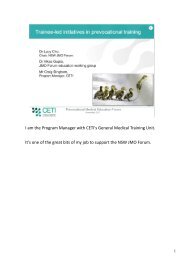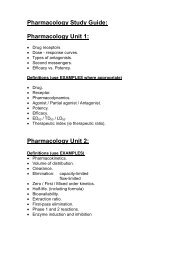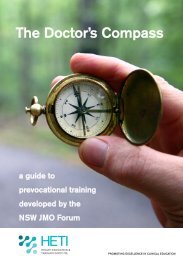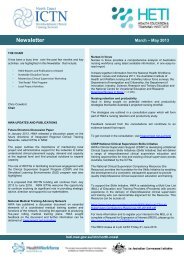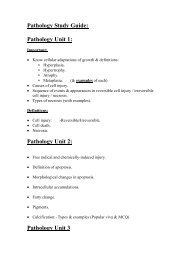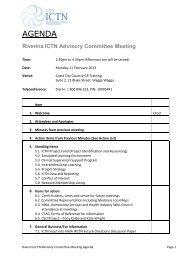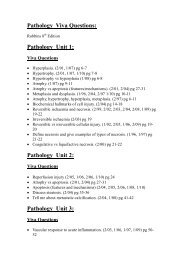Network principles for prevocational medical training - HETI
Network principles for prevocational medical training - HETI
Network principles for prevocational medical training - HETI
You also want an ePaper? Increase the reach of your titles
YUMPU automatically turns print PDFs into web optimized ePapers that Google loves.
Learning model part 5: <strong>Network</strong> lecture series<br />
Key elements<br />
• z The <strong>Network</strong> Committee <strong>for</strong> Prevocational Training coordinates and monitors <strong>for</strong>mal education<br />
programs across the network to ensure that trainees do not have gaps or unnecessary<br />
repetition as they rotate through <strong>training</strong> sites. Different networks achieve this in various ways:<br />
zz<br />
zz<br />
zz<br />
zz<br />
all trainees attend one site <strong>for</strong> educational sessions<br />
videoconferencing is used to link trainees at remote sites<br />
recorded lectures are provided to remote sites from one centre<br />
each site provides its own educational sessions, with network oversight to ensure that<br />
trainees receive essential sessions regardless of where they are on rotation.<br />
Curriculum<br />
• z Framework: ACF<br />
• z JMO Forum unified lecture series<br />
(see page 12)<br />
• z <strong>Network</strong>-led curriculum planning.<br />
Trainee assessment<br />
• z Participation records<br />
Program evaluation<br />
• z Participation records<br />
• z Trainee education evaluation <strong>for</strong>ms<br />
• z Monitoring of trainee outcomes.<br />
What rate of trainee participation is required?<br />
Some <strong>training</strong> sites report difficulties getting <strong>prevocational</strong> trainees to attend lectures.<br />
The Prevocational Training Council recommends that it is appropriate to require attendance at:<br />
• z all core <strong>training</strong> activities, which include DETECT (approach to the deteriorating patient), basic<br />
and advanced life support courses, communication workshops (including breaking bad news)<br />
and any other session deemed core <strong>training</strong> by the <strong>Network</strong> Committee <strong>for</strong> Prevocational<br />
Training<br />
• z all of intern orientation week and all term orientation activities<br />
• z a percentage (to be determined by the <strong>Network</strong> Committee <strong>for</strong> Prevocational Training) of all<br />
other educational sessions.<br />
Inadequate attendance can be deemed a failure to pass the <strong>training</strong> term.<br />
En<strong>for</strong>cing attendance is only acceptable if the network and the <strong>training</strong> facility meets organisational<br />
requirements:<br />
• z the educational program must be regularly scheduled and publicised<br />
• z educational presenters should be appropriately qualified and prepared<br />
• z term supervisors and other clinical team members must understand that releasing <strong>prevocational</strong><br />
trainees <strong>for</strong> their scheduled education sessions is required in all but exceptional circumstances<br />
z • the pagers of <strong>prevocational</strong> trainees should be held <strong>for</strong> them by the JMO unit or some other<br />
appropriate party so that educational time is protected.<br />
14



